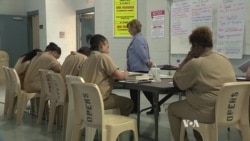In the United States in the 1980s, lawmakers launched a war on drugs that led to tougher sentencing. The prison population exploded, with the nation dubiously setting the world’s highest incarceration rate – as many as 716 per 100,000 people, at one point. Today, candidates of both political parties, complaining about the high cost of housing inmates and the damage to inmates' families, are among those pressing for reforms.
"We have a criminal justice system which is broken," Democratic presidential candidate and U.S. Senator Bernie Sanders of Vermont has said repeatedly on the campaign trail.
"We are all unified in saying commonsense reforms need to be enacted to our criminal justice system," Republican candidate and U.S. Senator Ted Cruz of Texas contends.
Obama presses for change
President Barack Obama has made criminal justice reform one of his priorities in his final years in office. In late October, prompted by police-involved shootings and racial tensions, he devoted a weekly radio address to the problem.
"Every year, we spend $80 billion in taxpayer dollars to keep people incarcerated," the president said, listing his efforts throughout the year that led to the address. He called for "smarter, fairer and more effective" criminal justice.
In Tennessee, Shelby County Mayor Mark Luttrell Jr. shares that concern. A Republican, he was a guest at Obama's final State of the Union address in January, invited to sit in the first lady’s VIP section because of his efforts to stop inmates from re-offending.
Luttrell has overseen creation of specialized courts for mental health and drug cases, for instance. He's been a force behind the Memphis/Shelby County Office of Re-entry, or MSCOR, which opened in the spring of 2015 to provide support for so-called "returning citizens" as they adjust to freedom.
Training behind bars
A former prison warden, Luttrell also supports efforts by community members to work with current and former inmates. One of MSCOR’s partners is HopeWorks, a faith-based charity that runs daily classes at the Shelby County Correctional Center, a medium- and maximum-security security prison in western Tennessee. Teachers give tips on jobs and on family, all sprinkled with a dose of religion.
"The idea is to start becoming aware of how much we’re spending," Gilda Shelby, a specialist in job placement and retention, tells almost a dozen women gathered around her in the center’s multipurpose room.
That's good advice for any finance class. But it carries a different meaning when the students can't go home.
"It was God’s plan for me to come to prison. I never thought I’d pray and thank God for being in prison, but I did," says Doreen Owens, one of the inmates.
Owens says she wanted to get off drugs in the past, but never had the resources or support until she was directed to HopeWorks in prison. She adds that its training has prepared her to rebuild family life and find work on the outside. "Today, I’m ready. I’m not going to stop" fighting to stay clean.
Support outside corrections
Inmate Sheree Head also is looking beyond the prison walls and toward a future that includes paid work. "I need to plan for savings, retirement plans and 401(k)," she said, referring to an employer-sponsored retirement savings plan.
On the outside, ex-offenders can find support at MSCOR. It’s open to any ex-offender living in Shelby County, whether the person was released from a facility the previous week or years earlier.
At MSCOR's office in a poor Memphis neighborhood, individuals get assigned a case manager to help with social services such as job training, family reunification, healthcare, housing and transportation.
The MSCOR program also includes a life coaching class. Students meet for a class at least one evening or morning a month for several months, learning how to make better choices, manage anger and frustration, avoid trouble and find work.
Recidivism risks
Nationally, three out of five ex-offenders will end up back behind bars within three years. Luttrell said the MSCOR program is too new to have produced reliable statistics, though he suggests its wraparound services will help reduce recidivism.
"Education is the overarching issue," he said. "Education is the tide that raises all boats. If you’ve got a strong education system, it has an impact on criminal behavior." The mayor says the average education level of prisoners is less than eighth grade.
The presidential candidates don't view criminal justice reform as a top campaign issue. But the momentum to do something beyond the state level could change that – after one of them becomes president.
Carol Guensburg contributed to this report.





